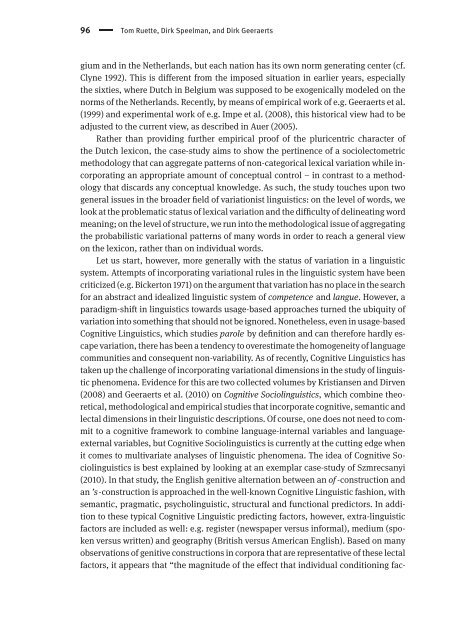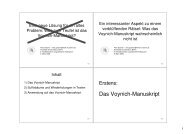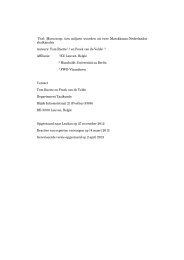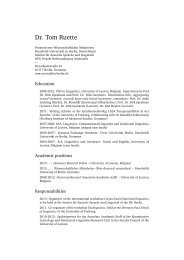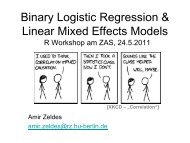Lexical variation in aggregate perspective
Lexical variation in aggregate perspective
Lexical variation in aggregate perspective
Create successful ePaper yourself
Turn your PDF publications into a flip-book with our unique Google optimized e-Paper software.
96 Tom Ruette, Dirk Speelman, and Dirk Geeraerts<br />
gium and <strong>in</strong> the Netherlands, but each nation has its own norm generat<strong>in</strong>g center (cf.<br />
Clyne 1992). This is different from the imposed situation <strong>in</strong> earlier years, especially<br />
the sixties, where Dutch <strong>in</strong> Belgium was supposed to be exogenically modeled on the<br />
norms of the Netherlands. Recently, by means of empirical work of e.g. Geeraerts et al.<br />
(1999) and experimental work of e.g. Impe et al. (2008), this historical view had to be<br />
adjusted to the current view, as described <strong>in</strong> Auer (2005).<br />
Rather than provid<strong>in</strong>g further empirical proof of the pluricentric character of<br />
the Dutch lexicon, the case-study aims to show the pert<strong>in</strong>ence of a sociolectometric<br />
methodology that can <strong>aggregate</strong> patterns of non-categorical lexical <strong>variation</strong> while <strong>in</strong>corporat<strong>in</strong>g<br />
an appropriate amount of conceptual control – <strong>in</strong> contrast to a methodology<br />
that discards any conceptual knowledge. As such, the study touches upon two<br />
general issues <strong>in</strong> the broader field of <strong>variation</strong>ist l<strong>in</strong>guistics: on the level of words, we<br />
look at the problematic status of lexical <strong>variation</strong> and the difficulty of del<strong>in</strong>eat<strong>in</strong>g word<br />
mean<strong>in</strong>g; on the level of structure, we run <strong>in</strong>to the methodological issue of aggregat<strong>in</strong>g<br />
the probabilistic <strong>variation</strong>al patterns of many words <strong>in</strong> order to reach a general view<br />
on the lexicon, rather than on <strong>in</strong>dividual words.<br />
Let us start, however, more generally with the status of <strong>variation</strong> <strong>in</strong> a l<strong>in</strong>guistic<br />
system. Attempts of <strong>in</strong>corporat<strong>in</strong>g <strong>variation</strong>al rules <strong>in</strong> the l<strong>in</strong>guistic system have been<br />
criticized (e.g. Bickerton 1971) on the argument that <strong>variation</strong> has no place <strong>in</strong> the search<br />
for an abstract and idealized l<strong>in</strong>guistic system of competence and langue. However, a<br />
paradigm-shift <strong>in</strong> l<strong>in</strong>guistics towards usage-based approaches turned the ubiquity of<br />
<strong>variation</strong> <strong>in</strong>to someth<strong>in</strong>g that should not be ignored. Nonetheless, even <strong>in</strong> usage-based<br />
Cognitive L<strong>in</strong>guistics, which studies parole by def<strong>in</strong>ition and can therefore hardly escape<br />
<strong>variation</strong>, there has been a tendency to overestimate the homogeneity of language<br />
communities and consequent non-variability. As of recently, Cognitive L<strong>in</strong>guistics has<br />
taken up the challenge of <strong>in</strong>corporat<strong>in</strong>g <strong>variation</strong>al dimensions <strong>in</strong> the study of l<strong>in</strong>guistic<br />
phenomena. Evidence for this are two collected volumes by Kristiansen and Dirven<br />
(2008) and Geeraerts et al. (2010) on Cognitive Sociol<strong>in</strong>guistics, which comb<strong>in</strong>e theoretical,<br />
methodological and empirical studies that <strong>in</strong>corporate cognitive, semantic and<br />
lectal dimensions <strong>in</strong> their l<strong>in</strong>guistic descriptions. Of course, one does not need to commit<br />
to a cognitive framework to comb<strong>in</strong>e language-<strong>in</strong>ternal variables and languageexternal<br />
variables, but Cognitive Sociol<strong>in</strong>guistics is currently at the cutt<strong>in</strong>g edge when<br />
it comes to multivariate analyses of l<strong>in</strong>guistic phenomena. The idea of Cognitive Sociol<strong>in</strong>guistics<br />
is best expla<strong>in</strong>ed by look<strong>in</strong>g at an exemplar case-study of Szmrecsanyi<br />
(2010). In that study, the English genitive alternation between an of -construction and<br />
an ’s-construction is approached <strong>in</strong> the well-known Cognitive L<strong>in</strong>guistic fashion, with<br />
semantic, pragmatic, psychol<strong>in</strong>guistic, structural and functional predictors. In addition<br />
to these typical Cognitive L<strong>in</strong>guistic predict<strong>in</strong>g factors, however, extra-l<strong>in</strong>guistic<br />
factors are <strong>in</strong>cluded as well: e.g. register (newspaper versus <strong>in</strong>formal), medium (spoken<br />
versus written) and geography (British versus American English). Based on many<br />
observations of genitive constructions <strong>in</strong> corpora that are representative of these lectal<br />
factors, it appears that “the magnitude of the effect that <strong>in</strong>dividual condition<strong>in</strong>g fac-


